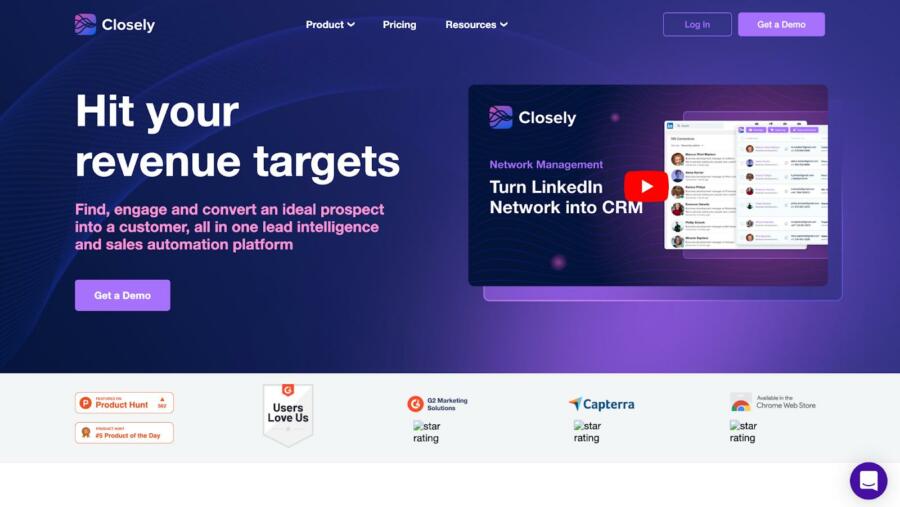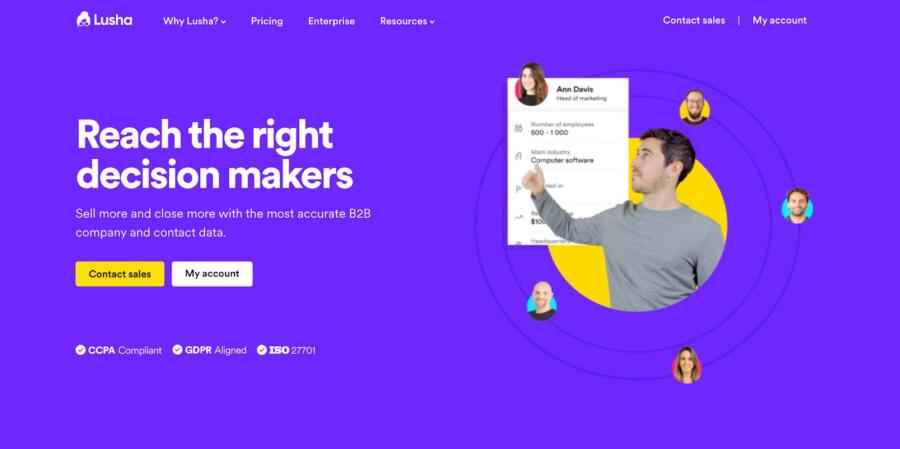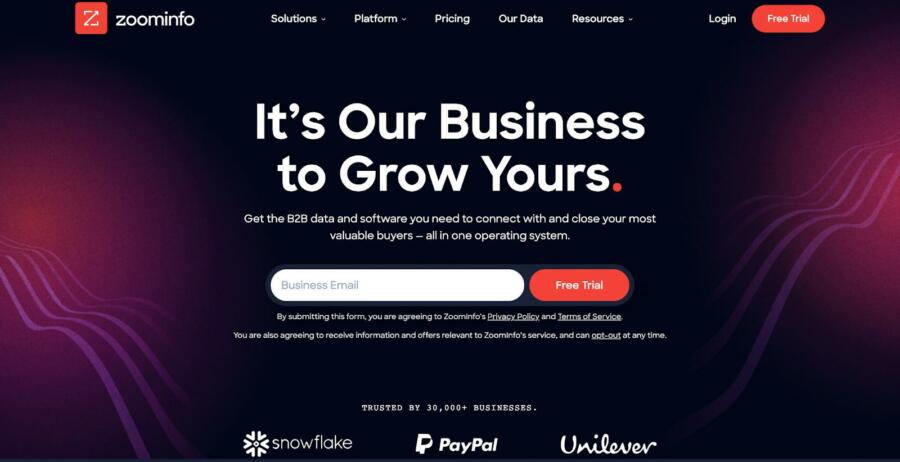There are a lot of different B2B databases out there. So, which one is the best? It really depends on what you’re looking for and how you plan to use it. From Apollo and ZoomInfo to Closely and Lusha, there are a lot of options when it comes to B2B databases. So, how do you choose?
In this blog post, we will explore the different types of B2B databases and help you determine which one is right for your business needs.
What a B2B marketing database is

A B2B marketing database is a list of businesses that have been categorized by industry, size, location, interest, or a myriad of other factors. This type of database is used by sales and marketing professionals to target their pitch to the right audiences. The most effective B2B marketing databases are constantly updated with new information so that they are always accurate and updated. This information will consist of:
- Demographic data: This is your basic personal information; the population’s age, contact information, location, interests and skills.
- Firmographic data: This is business and company data, including the company’s name, even industry, location and size (both in revenue and number of employees).
- Technographic data: These are the software and hardware that your potential customers are using.
- Chronograph data: This refers to the events occurring in your target company’s business environment. Running data that asks what makes this client potentially more receptive to your products or services. This will include things like a company IPO, revenue reports, and hiring and transferring within the business.
- Intent data: By far the most “invasive” information, this data is related to the potential buyer’s online behaviours; signalling how intent they may be to buy or begin their buying process.
The best B2B marketing databases will offer features such as specific company profiles and intent data. FlashCloud allows sales and marketing teams to get a complete picture of their target audience so that they can create the most effective campaigns possible.
How to obtain accurate B2B data
There are a few key things to keep in mind when trying to get accurate B2B data. First, make sure you have a good understanding of your target market. A good knowledge base will help you understand what kind of information you should be looking for; pain points, FAQs about other products, and your competitors.
Second, use multiple sources of information to cross-check your data. If getting verified information is required at the academic level, it’s for good reason. Cross-referencing can help you verify the accuracy of the data and fill in any gaps.
There are two main forums for accessing B2B data, public channels and private channels.
Public channels are, as the name suggests, sources where personal information is already public domain. Think of online data, social media and any form of public journalism.
Private channels, on the other hand, are sources that are harder to come by, due to their restrictive nature. This information is only accessible to those with permission and usually found behind a paywall. Best examples here would be Newspaper online articles (after the first 3-5 articles have been read), or any “data as a service” companies gathering data for exactly one reason; to sell it.
These channels can be accessed both in-house and out-of-house (also called outsourcing). What we mean by in and out-of-house is that this information can either be hunted down by teams of IT reps in your own company (in-house) or you can source the problem out to professionals and pay a fee to have the information brought to you instead.
Both options have their pros and cons, namely the time suck of searching for the information yourself vs the cost of paying someone else to find it for you, but the general consensus is that in the long run, it is far more profitable to have an outsourced information stream rather than throwing time at a problem to solve one problem (time is money, after all).
How to create an effective B2B database
Now that we know what kind of information we want and how to get it, there are a few key things to keep in mind when creating an effective B2B database:
1. Keep your database well-organized and up-to-date. This will make it easier for you and your team to find the information you need when you need it.
2. Make sure to include all relevant information for each contact. This includes basic contact info, such as name and title, as well as any specific details that may be relevant to your business dealings with them. The more specific, the better.
3. Pay attention to data quality. Inaccurate or outdated information can lead to wasted time and resources, so it’s important to make sure your data is as accurate as possible. (Include link here to other article about prospecting tools – specifically the one that updates this info every 90 days).
4. Keep your database secure. Since this information is likely sensitive in nature, it’s important to take measures to ensure that only authorized individuals have access to it. You paid for this information (in either time or money), best to treat it as something valuable.
The best B2B contact database for marketing today
The best B2B contact database for marketing today is a comprehensive, up-to-date resource that can provide you with the information you need to reach your target market. This database should offer you the ability to segment your list of contacts according to their specific needs and interests, allowing you to tailor your marketing messages to appeal to each group and increase your chances of making a sale.
When choosing a B2B contact database, be sure to select one that offers a wide range of features and options. The best providers will offer you the ability to customize your lists according to your specific requirements.
Additionally, they should also provide you with the ability to track the results of your marketing campaigns so that you can determine which ones are working and which ones are not. The best providers will also offer you customer support in case you have any questions or concerns about using their service. Here are some examples that do exactly that:
1. Closely

Closely is an all-in-one lead engagement platform that offers access to one of the largest B2B contact databases out there. It’s equipped with a set of filters to let you drill down to high-quality prospects.
The tool is quite affordable for sales teams of any size. The greatest part about it – it offers email verification, LinkedIn automation, LinkedIn Inbox and Network management, personalised campaigns and advanced lead building features – all mentioned features included in a package of $50/month.
Closely’s database is very accurate (70% of emails are relevant – ready to receive emails). Along with emails, you can look up phone numbers, Facebook profiles and company insights of your prospects. You can run data verification right in the tool – and get back a file of cleaned data to improve open and reply rates of your email campaigns.
2. Lusha

Lusha is an incredibly popular database that offers a simple, accurate, and streamlined way to build a database inside its own Chrome extension. This database commands high conversion rates and connects you with your prospects faster, which means you’ll spend more time receiving the right emails and numbers, bringing in more relevant leads for sales.
3. ZoomInfo

A B2B database provider with an array of applications, ZoomInfo is compatible with CRM sources, web browsers and extensions like chrome,, marketing, recruiting teams, and targeting sales. Enterprise companies would do especially well with ZoomInfo’s assistance.
ZoomInfo can cost you up to $15,000 a year, billed annually only.
4. Leadiro

Leadiro is a global database of sales intelligence. It provides actionable data for marketing, enterprise executives, and sales to help reach their preferred clients. Leadiro targets enterprises of all sizes, so its scope is massive.
Used literature:
Business-to-business // en.wikipedia.org
Database marketing // en.wikipedia.org
When You’re a Small Business, E-Commerce Is Tougher Than It Looks // The New York Times
5. Ampliz Salesbuddy

Designed mainly for the US market, Ampliz Salesbuddy will get the details needed for meeting your lead generation needs. This cloud-based marketing database can find email addresses, direct phone numbers, and has an extension with access to a mountain of B2B data.
In conclusion
A strong B2B database is more than just a potential client list, it contains key insights designed to shape not only whom to contact but how and why. Proper information must be processed and put into the system before the right profile can be found to pitch to.
Whether by outsourcing or acquiring in-house, make sure your database is up-to-date, well-protected, and well-used. We’ve listed the best and tested databases in this article. Make sure you’ve tested some of them and come to the choice that will best suit your current marketing needs.
























































